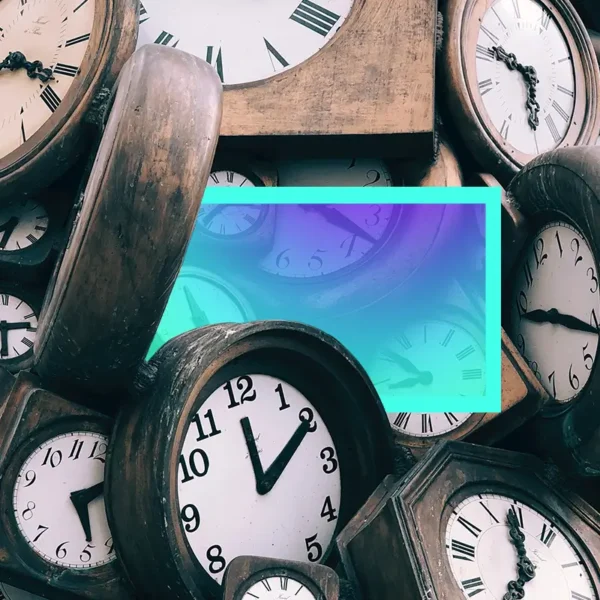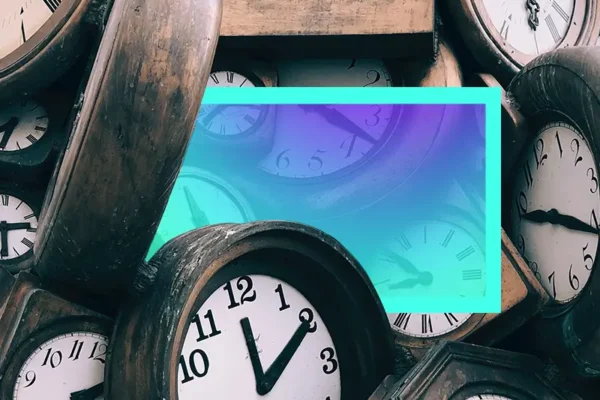ROHAN GUNATILLAKE: Thank you for taking some time to join us today. In this special episode, we’ll drop into an immersive meditation designed to help you slow down and become more aware of what’s happening right now.
I once spent over two hours just watching a clock tick round. It was a round, white, fairly basic wall clock, hung in a room in Devon, on the south coast of England. The clock was at one end of a room with lovely wooden floors. I walked up and down, a little bit slower than my normal pace, feeling the warm wood under my bare feet, the boards telling me its stories of the forest with every step. Just remembering that day I can feel it now. And as I walked my eyes were fixed on the clock, relaxed but steady. I’d turn my back as I walked away and then we’d meet again face to face as I stepped towards it. Sometimes — often — I would just stop and stand and gaze on the clock as it tick, tick, ticked round. For several minutes at a time.
Now, this might sound like a fairly weird thing to do. But when you go down the meditation rabbit hole like I’ve done in the past, you can end up doing some fairly weird things. Importantly, this was an afternoon which I look back on with great fondness. Because I think it changed my relationship with time forever.
It’s hard to describe how it did that but I’ll try.
There was a moment while doing this. The mind was very quiet. But it was also alive and vibrant and just on. Capital O, capital N — ON. But also super relaxed. And all of a sudden an insight arose. Unbidden. Time is change. Ah. Time is change. What does that mean? I walked with that insight up and down, me and the clock, left and right. Time is change. Oh. Time is change. Oh. Time is just change. Time is not a thing. It’s change. It is how we know change.
So it’s fair to say that time is often on my mind.
And it is especially so with 2024 being a leap year. You may even be listening to this on February 29th, this rarest of days. So it made me wonder what a leap year meditation might be like, so I guess we’re going to find out.
Leap years are wild. They are of course based on the fact that it doesn’t take 365 days to go fully around the sun, it takes more like 365 and a quarter days… and so we have the leap day every four years to account for that.
I love that. The idea that there are these pockets of time that we don’t notice. I wonder if we can find one now?
However your body is, do what you can to let it relax that little bit more than it already is.
Let it take up more space.
No need to hold anything in.
In fact the opposite, wanting to let everything hang out.
With eyes open or closed.
Asking the question: what does time feel like here?
How do I know it?
Is it even here?
Or am I currently in a pocket of time that no one knows about?
Part of the joy of a leap year is that it happens every four years.
Also part of its joy is that it’s not applied universally.
Some calendars add it at the end of the year.
Some use a leap month to keep all the days accounted for.
Which points to how arbitrary it is how we mark this thing called time.
We use this whole 60 seconds in a minute and 60 minutes in an hour thing because of the Bablyonians.
We use our particular Western calendar because of some dude called Gregory and the religion — based power he held over Europe in the 16th century.
So again…
With body relaxed, let’s drop in another question:
What time is it?
Interested in whatever answer comes up.
What time is it?
Letting another response arise.
Softly asking the question, allowing the layers of answers to arise if they arise.
What time is it?
Whose time is it?
Finally, in many parts of the world, a leap day is a time for celebration.
So, my final question for you is simple: What will you celebrate today?
Most holidays have a theme already but the Leap Day is a bit of a free hit to do something
different, a chance to make your own tradition.
So what’s it going to be?
We’d love to know so do get in touch.
And with that, I’ll bid you farewell.
Until next time.
Whatever that is….






